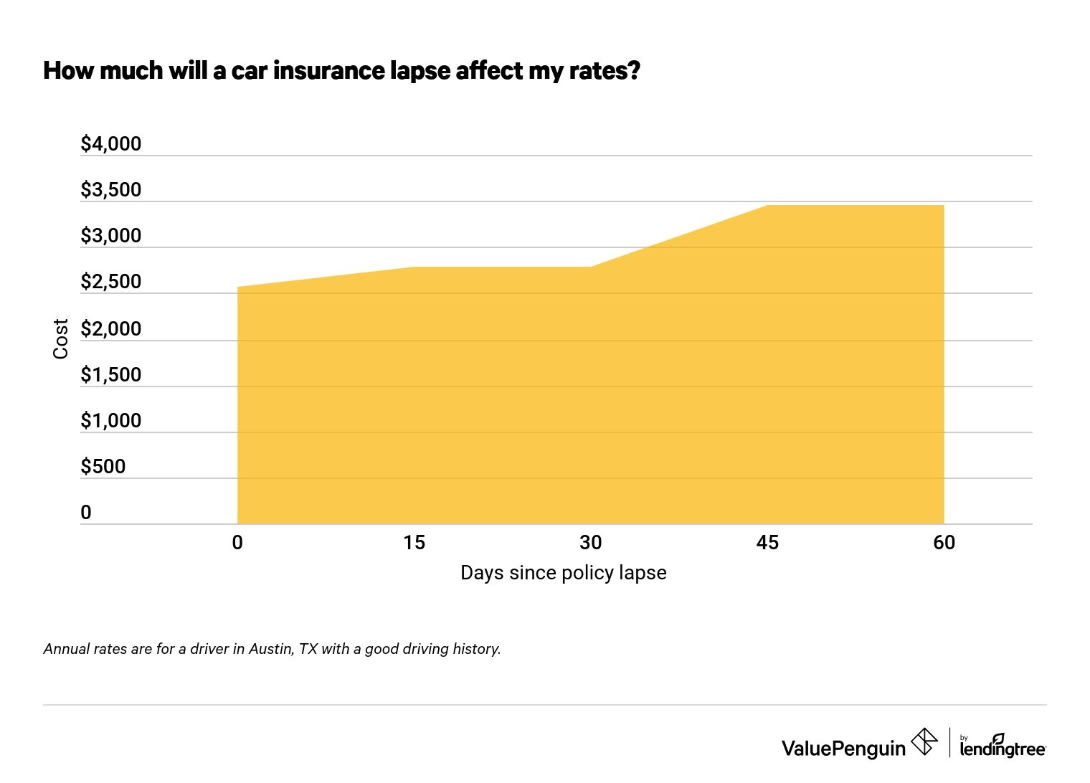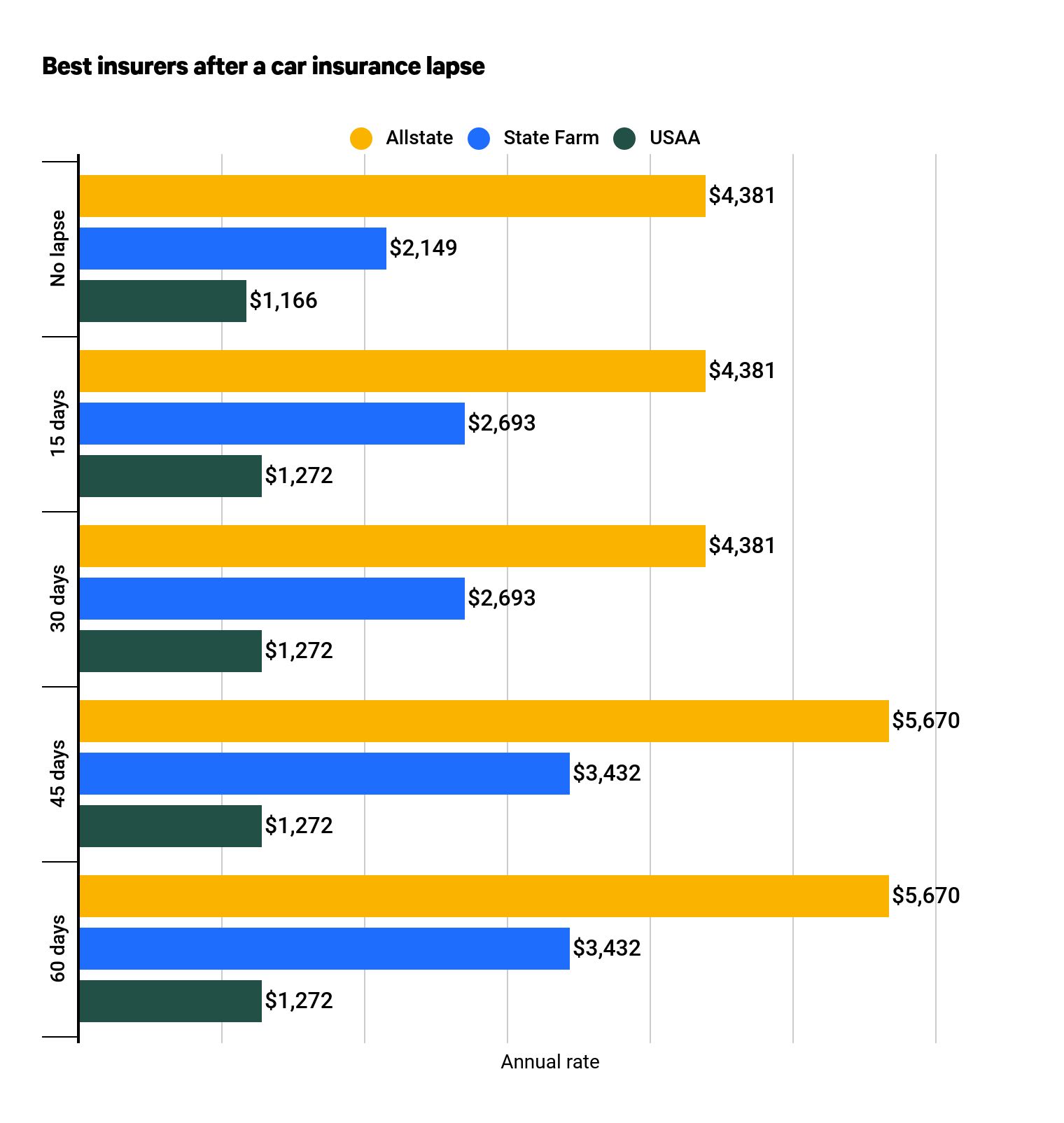How Does a Lapse in Car Insurance Coverage Affect Rates?
Having a lapse in your car insurance automatically pegs you as a potential risk to insurance companies. To insurers, this type of risky behavior increases your chance of getting into a car accident.
As a result, your insurer will likely raise your rates. Based on our analysis, drivers with a coverage lapse of 30 days or less saw an 8% average car insurance rate increase. And those with a coverage lapse greater than 30 days saw an average rate increase of 35%.
Given that you'll likely pay a hefty markup for car insurance if you let your policy lapse, it's important not to have a break in coverage — even if you only have the absolute minimum coverage amount.
Find Cheap Auto Insurance Quotes in Your Area
How much will auto insurance rates increase after a lapse?
The penalty for a car insurance lapse is fairly small (an average 8% increase) if the lapse is under 30 days but is much higher (35%) if your lapse is 31 days or more.
To get an idea of how much rates would increase, we collected quotes from three top national insurers: Allstate, State Farm and USAA. Our sample profiles included drivers who still have current insurance and those who have let their policy lapse in increasing 15-day increments, up to 60 days.

Find Cheap Auto Insurance Quotes in Your Area
The results show the importance of getting back on an auto insurance policy as soon as your old plan ends. Unsurprisingly, the longer you wait to put your insurance policy back into effect, the higher the penalty you'll pay.
There appears to be a small penalty for drivers with a lapsed policy of fewer than 30 days, but if you let the lapse go on for longer, the penalty can dramatically rise to an average increase of 35% per year. That can translate to hundreds of dollars that you could avoid overpaying.
In our sample, USAA increased rates by the smallest amount, while State Farm had the largest penalty. However, the price you pay for car insurance is affected by a wide variety of factors, including where you live, your age and your driving history.
Note: Nonstandard insurers
It's also possible that a longer lapse will result in an insurer denying you coverage altogether, as letting your policy lapse is a sign you may be a high-risk driver.
If you're denied coverage from an insurer after a lapse, continue to shop around at other major companies before moving on to insurers that specialize in high-risk drivers. Insurers that specialize in higher-risk drivers have fewer coverage options, discounts and extras, so getting insurance from a major company is preferable. They also sometimes have worse service when compared with companies like State Farm and Geico.
Again, we always recommend getting quotes from multiple insurers, as comparing rates can be one of the best ways to find savings on car insurance.
What should you do if you have a lapse in coverage?
If your car insurance accidentally lapses, start by calling your current insurer. While it's not a guarantee, it's possible they can reinstate your policy with minimal consequences, especially if it's only a lapse of a few days.
If your insurer is requiring you to get a new policy, it's worth shopping around for a better price. But do so quickly — the longer you go without car insurance, the steeper the penalty will likely be once you restart it.
The one thing you should never do is drive uninsured. Driving without insurance is dangerous and illegal. Consequences vary by state, but common penalties for driving while uninsured include losing your license and having your car impounded. If you're involved in a crash while driving uninsured, you could even face jail time. iIf you're facing a lapse in your policy because you're unable to make your car insurance payment, werecommend checking with multiple insurers to see if you can find a more affordable rate. Also check to see if you qualify for extra discounts to save money that way. You can also save by lowering the amount of coverage you have.
Best insurers for lapsed car insurance coverage
Among our sample insurers, USAA had the lowest change in rates for a driver with an insurance lapse, as well as the lowest prices overall. Adriver with as much as a 60-day policy lapse may only see an increase of 9% with USAA.

Allstate was the most expensive option overall for our sample driver, though it didn't raise rates for either a 15- or 30-day lapse. This is why shopping around for the lowest rate is essential when buying car insurance.
Car insurance rates after coverage lapse
Days since lapse | 0 | 15 | 30 | 45 | 60 |
|---|---|---|---|---|---|
| Allstate | $4,381 | $4,381 | $4,381 | $5,670 | $5,670 |
| State Farm | $2,149 | $2,693 | $2,693 | $3,432 | $3,432 |
| USAA | $1,166 | $1,272 | $1,272 | $1,272 | $1,272 |
| Average | $2,565 | $2,782 | $2,782 | $3,458 | $3,458 |
What is a lapse in car insurance?
A lapse in car insurance is any period in which you have a registered car, but do not have car insurance.
A lapse can be as short as one day, however, some insurers will not penalize you for a lapse of under two weeks. There may be several reasons you experience a lapse: your policy ran out, your policy was canceled because you missed a payment, you no longer drive, you were deployed and many more.
If your policy ends due to missed payment or you forget to renew the policy
A common scenario is that you missed a monthly payment or forgot to renew your policy after it expired, leading your company to cancel the policy. Once your policy is no longer in effect, your car insurance company may notify the DMV that you are uninsured.
Depending on the state, being uninsured may leave you open to fines and numerous other penalties. The longer you wait to renew your policy, the more your rates will likely go up as well.
If you are deployed overseas or studying/moving abroad
If you are being deployed overseas, you probably won't be using your car much. The same goes for those living or studying abroad for a period of time. Military members have a few companies — like USAA, Geico and Esurance — that allow them to suspend car insurance while they're away.
Suspending insurance is not considered a lapse and can spare you from raised rates. If you are studying or moving abroad, you will have to get an affidavit from your state's DMV stating that you will not be using the vehicle.
Not every company will allow you to temporarily suspend or pause your car insurance.
If your car is financed with a lease or loan, you probably won't have the option to suspend coverage. If suspension is not possible, you can remove yourself from the policy (if there are others on it) or cancel your insurance. Unfortunately, that would be considered a lapse in coverage and leave you open to raised rates from your insurance company. You may be able to avoid any DMV and state penalties, however, by filling out an exemption form from the DMV.
Which states impose a penalty for a lapse in coverage?
If you have a registered vehicle, you need car insurance in almost every state in the U.S. Some states are better than others at regulating that, going as far as having companies report to state DMVs whenever the insurance for a registered car has lapsed. When the DMV knows about your lapse, you leave yourself open to a license and/or registration suspension, civil fines and SR-22 filings, among other penalties.
Keep in mind that these fees only relate to letting your insurance lapse. If you're caught behind the wheel without proper insurance, you'll likely face even harsher consequences.
Here's what you can expect for each state:
State | Penalties |
|---|---|
|
Alabama | $200 license reinstatement penalty, then $400 second time |
|
Alaska | $100 license reinstatement penalty for first lapse |
|
Arizona | $50 license reinstatement penalty |
|
Arkansas | $100 license reinstatement penalty |
|
California | $14 registration reinstatement penalty |
|
Colorado | $40 license reinstatement penalty |
|
Connecticut | $200 license reinstatement penalty |
|
Delaware | $100 lapse penalty per vehicle, $5 per day after 30 days |
|
District of Columbia | $150 lapse penalty, $7 per day after 30 days |
|
Florida | $150 registration and license reinstatement penalty for first lapse, $250 for second, $500 for third |
|
Georgia | $25 penalty for lapse longer than 10 days, then $60 after 30 days |
|
Hawaii | $20 license reinstatement penalty |
While some states have harsher penalties than others, the bottom line is that you should try to never let your auto insurance lapse. At the very least, you're likely to see your car insurance rates increase, and depending on your state, may face major legal penalties, too.
How insurers find out if your insurance lapses
When you're getting a quote for car insurance, you're usually asked if you have coverage. If you've let your insurance lapse, be honest. Car insurers work with state DMVs to keep accurate databases of who has car insurance and when it may have lapsed. So while you might be able to get a cheaper quote by leaving out the fact that you had a gap in insurance, your insurer will find out eventually.
The best-case result is that your insurer will just increase your rates to what you would have paid had you told the truth. But it's also possible that your insurer will choose to cancel your policy, leaving you in the same situation you were in before — but with two lapses instead of one.
Methodology
ValuePenguin's analysis used insurance rate data from Quadrant Information Services. These rates were publicly sourced from insurer filings and should be used for comparative purposes only — your own quotes may be different.
About the Author
Lead Writer
Matt Timmons is a Lead Writer on the insurance team at ValuePenguin, where he writes in-depth and timely pieces helping find the right coverage for them.
He's covered insurance at ValuePenguin since 2018, specializing in auto and home insurance, as well as life insurance. He's paid special attention to the EV insurance market, where prices are much higher than for gas cars.
Before he started writing about personal finance, Matt wrote about professional skills and online tools at an e-learning company.
How insurance helped Matt
During freshman orientation in college, Matt's iPod was stolen off his table while he was eating lunch. Luckily, he'd bought a college insurance plan the day before and he had money to buy a replacement before classes started.
Expertise
- Auto insurance
- Home insurance
- Insurance rate analysis
- Life insurance
Referenced by
- CNBC
- Miami Herald
- Yahoo! Finance
Education
- BA, Wesleyan University
Editorial Note: The content of this article is based on the author's opinions and recommendations alone. It has not been previewed, commissioned or otherwise endorsed by any of our network partners.
